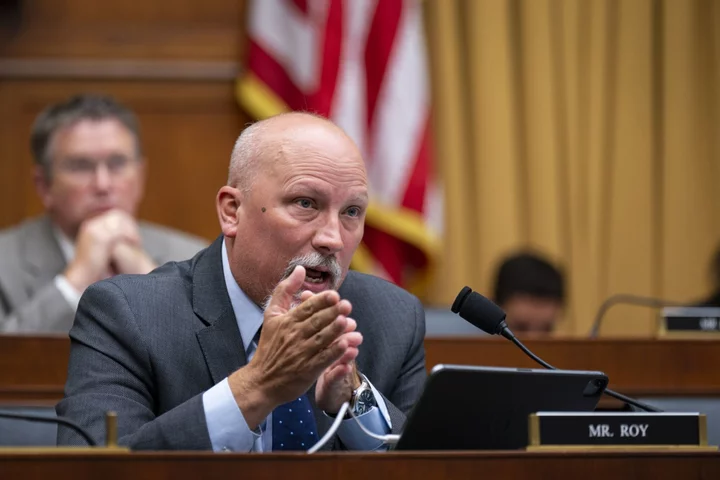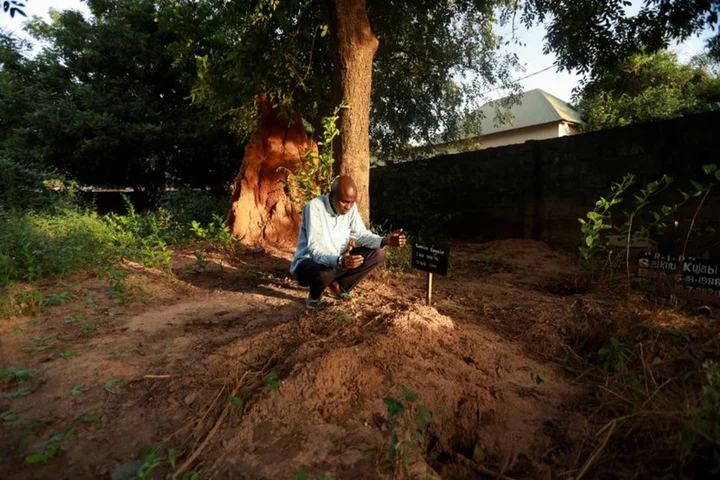House Republicans are preparing to turn an impending government shutdown into a clash with Democrats over border enforcement as New York, Chicago and other major cities struggle with a migrant influx.
The approach is intended to temporarily set aside differences among GOP lawmakers over how deeply and where to cut federal spending while maintaining a collision course with Democrats that risks shutting down the US government on Oct. 1.
Architects of the plan hope the cause will have broader public appeal as concerns about immigration rise in new areas of the country. Democratic New York City Mayor Eric Adams said this month an increase in migration would “destroy” his city, seeking federal support as Republican governors bus migrants into northern cities.
Those concerns, key Republicans argue, will better position the party’s rank-and-file lawmakers to withstand backlash against any interruption of government services and improve the House GOP’s chances of wringing concessions from President Joe Biden and Senate Democrats.
It also heightens the risk of double-barrel shutdowns. First, an October standoff focused on immigration policy demands to open up about a month of funding for the government. Then, more fiscal showdowns as soon as November that wrap in conflicts over federal spending before Congress approves annual funding for the government.
Read more: New York Leads Big Cities’ Anger Over Biden’s Border Response
Members of House Republicans’ ultra-conservative Freedom Caucus and more-moderate Main Street Caucus have been coalescing around the immigration-focused strategy in closed-door meetings over recent days. Leaders of the factions have been trying to hammer out a unified position for House Republicans going into a fight over temporary funding to keep the government operating beyond Sept. 30.
“We have to hold the line and demand change and pick an issue we are going to change,” Freedom Caucus member Chip Roy of Texas, a participant in the talks, said Friday. “We can’t get everything we are going to want.”
House Republicans preparations for a fiscal showdown so far have been chaotic. Hardliners demanding deep spending cuts have clashed with more moderate lawmakers eager to protect priorities such as military readiness, national parks and cancer research.
The party hasn’t been able to unify around spending legislation even for traditional Republican priorities such as agriculture and defense. House Speaker Kevin McCarthy grew so frustrated with hardliners’ stubbornness that he dared them at a meeting Thursday to try to oust him from his leadership position.
Read more: McCarthy Dares Hardliners to Oust Him as Shutdown Fight Rages
Roy and other Freedom Caucus members want temporary funding for the government to include provisions limiting the ability of people who cross the US-Mexico border to seek asylum, a change that is anathema to most Democrats.
The hardliners are also negotiating with more moderate Republicans over whether a stopgap bill should include an expansion of requirements employers verify online immigration status for workers, a step that some pro-business Republicans object to as burdensome for farms and other small businesses.
Representative Stephanie Bice, vice-chair of the more moderate Main Street Caucus, said a fight on migration can unite the party’s divergent factions.
“Border security is the biggest issue right now,” she said. “It is something the entire conference can get behind.”
Freedom Caucus supporters of the tentative plan like Roy will need to convince other hardliners to set aside their demand for spending cuts, at least in the temporary funding measure. One way under discussion is a statement by McCarthy committing to deeper cuts in following spending measures.
The US Border Patrol logged more than 132,000 encounters along the Mexico border in July, up from about 100,000 the month before. That ended a decline in illegal border crossings that started in May when the Biden administration launched a series of measures to deter migrants from entering the US without authorization.
Biden is seeking $3.6 billion in emergency funding to bolster resources at the border to address the surge in migrants and combat smuggling of fentanyl.









